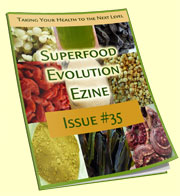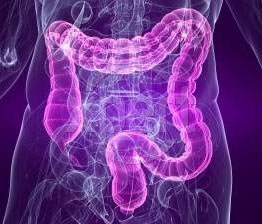| Back to Back Issues Page |
 |
|
Top Colon Cleansing Superfoods - Issue #35 March 15, 2013 |
~~~~~~~~~~~~~~~~~~~~~~~
IN THIS ISSUE:
~~~~~~~~~~~~~~~~~~~~~~~~
Why It’s Good to Colon CleanseThe colon or large intestine is the last stage of the digestive process and intimately connected to the health of all other systems in the body. When stagnation occurs in this region all other organs feel the consequences. Over time this can cause a number of health related side effects, including various digestive problems, inflammations and diseases. Chronic blockage in the colon can also deeply affect our thoughts, attitudes, moods, sleep patterns and emotions.
The colon can be compared to the foundation of a house, if you do not have a solid structure at the bottom the rest of the house is on shaky ground. Because the primary job of the colon is to absorb vitamins, nutrients, salts and water from the foods we eat and drink, it is important that we have clean healthy tissues lining the wall of the large intestine to obtain the proper amount of nutrition and expel any excess waste or toxins the body does not need. For those with a past or current diet of eating low quality foods high in trans fats, additives, preservatives and other unpronounceable ingredients, you could most likely use a little house cleaning in this area. In addition, we all take in environmental toxins on a daily basis, so it is important even for the healthy eater to do periodic colon cleansing at least twice a year and eat some of the foods recommended below to assist the process of detoxification on a regular basis. Top Superfoods that Clean the ColonAside from drinking plenty of water, fasting, enemas and colon hydrotherapy, all of which can be extremely beneficial for maintaining a super healthy colon, here are some of our favorite superfoods we recommend adding to the diet.1) Aloe vera gel - An excellent polysaccharide-rich food to use for colon maintainence. It is a gentle, living food laxative, relaxing and nourishing the stomach and colon membranes in a gentle, nurturing way. More on aloe here. 2) Chia or Flax seeds - These seeds are digestive aids producing a gelatinous substance that, when soaked in water, soothes the intestinal tract and normalizes bowel movements. Soaked chia seeds or flax can be blended into smoothies or drinks. 3) Psyllium husk - This is a fibrous seed from the plantain species. You can buy psyllium powder and mix it with water or blended drinks to help promote regular bowel movements. 4) Raw Fiber - This includes eating plenty of whole, raw fruits and vegetables high in enzymes needed for optimal digestion and assimilation of nutrients. 5) Super Juicing - Drinking raw, organic freshly pressed juice, high in chlorophyll from leafy green vegetables, is one of the most beneficial ways to clean out toxins and nourish colon health. 6) Milk Thistle Seed - Primarily known as a liver cleansing herb/seed, milk thistle is also helpful for stimulating digestive enzymes and breaking down fats in the foods you eat, acting as a mild laxative especially for those eating a high fat diet. 7) Sauerkraut - one of the major benefits of raw cultured vegetables or sauerkraut is that it helps to break down, not only the foods you eat with it, but the undigested waste material that is potentially trapped inside the walls of the intestinal tract. It is also a natural probiotic-rich food. See more about sauerkraut and how you can make your own at home.
8) Pau D’Arco - Pau d'arco (Tabebuia avellanedae) is a rain forest bark that is considered to be an analgesic, antioxidant, anti-parasitic, anti-microbial, anti-fungal, anti-viral, anti-bacterial, anti-inflammatory and laxative... all in one. It is an excellent choice for its colon cleansing affects and makes a delicious herbal tea. Colon Cleansing Super SupplementsHere are some of the best natural products to help maintain a superhealthy colon.
Until our next issue... May you thrive, prosper and evolve in the best of ways!
SUBSCRIBE TO OUR:
All information in this ezine is the personal view of the author and is for educational purposes only and not intended as medical advice, diagnosis or prescription. This information has not been evaluated by the FDA and is not intended to cure or prevent any disease.
|
| Back to Back Issues Page |







